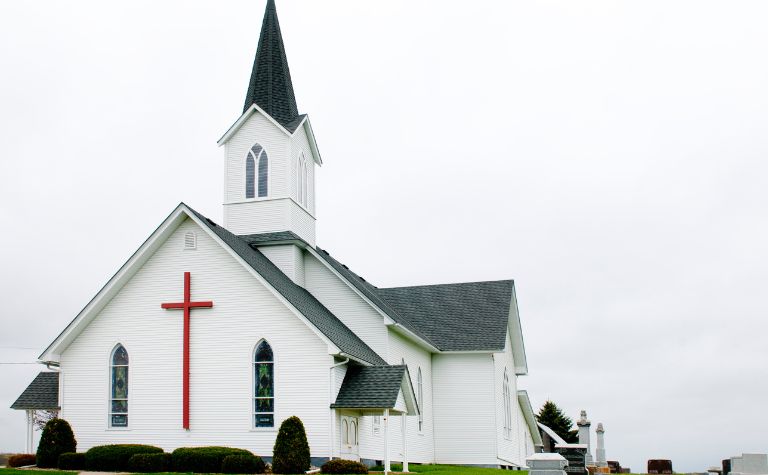The names “Protestant” and “evangelical” both describe Christians. In some contexts, they are differentiated from each other. In other contexts, they are used as synonyms. What are the similarities and differences between the two terms?
“Protestant” describes the Christian reform movement that started in 16th-century Europe that opposed certain doctrines and practices of the Catholic church. “Evangelical” describes a movement within Protestantism that began in the 19th century and grew in the 20th century that emphasizes the gospel.
Is “Protestant” a denomination? Is “evangelical” a denomination? What do Protestants think about the Bible, God, Jesus, the Holy Spirit, the Church, and the end times? What do evangelicals believe about these doctrines? Keep reading to learn more.
Also, see Compare Protestantism, Catholicism, and Orthodoxy to learn more.

Protestant vs. Evangelical: Overview
Evangelical Christianity did not emerge from a vacuum in the 19th century. The core convictions and practices of the movement have roots in Puritanism, Methodism, and 20th-century revivalism that marked European and American Christianity.
| Protestantism | Evangelicalism | |
|---|---|---|
| Origin | 16th-century Europe, especially Germany, under the reforms of Martin Luther (1483-1546) | The modern use of the term originated in the 20th century. It’s distinguished from liberal and fundamentalist movements. Fundamentalism has similar theology to evangelicalism. |
| Meaning of the name | The word “Protestant” comes from the Latin word protestari, meaning “to bear witness.” | The word “evangelical” comes from the Greek word euangelion meaning gospel or good news. The term describes a gospel-centered or cross-centered worldview. |
| Early influencer | Martin Luther, John Calvin of France (1509-1564), and Ulrich Zwingli of Switzerland (1484-1531) | English preacher Charles Spurgeon (1834-1892), American preacher Dwight L. Moody (1837-1899) |
| Significant writing outside the Bible | The Apostles Creed, the Nicene Creed; the writings and sermons of Martin Luther, especially the 95 Theses, Calvin’s The Institutes of the Christians Religion; many others | The same writing is important to Protestantism in general; numerous works from a variety of denominations emphasize a gospel-centered approach to evangelism, missions, biblical interpretation, and more; Christianity Today magazine. |
| Protestantism | Evangelicalism | |
|---|---|---|
| Organization | Protestant churches can be organized in different ways, such as congregationalism, presbyterianism, or episcopalianism. | Evangelicalism isn’t a denomination but a movement consisting of numerous denominations and even non-denominational churches. Evangelical churches can have congregational, presbyterian, or episcopalian church government. |
| What are the largest denominations in the tradition today? | Southern Baptist Convention, the United Methodist Church, the Evangelical Lutheran Church of America, and the Assemblies of God (see more below). | Churches in any denomination can be called “evangelical” if they centralize the gospel and emphasize other characteristics of the movement, such as valuing conversions and applying their faith through social causes like caring for the poor, widows, and orphans. |
| Divisions | There are hundreds of Protestant denominations. | There is significant diversity within evangelical Christianity; evangelical churches can have different theologies (though they are mostly Protestant), organizational models, and convictions on social issues. |
| Theological and Social worldview | Protestants may be liberal or conservative theologically or socially. | Historically, evangelical churches are conservative theologically and socially; in recent years, some self-identifying evangelical churches have drifted from conservative theology and adopted modern social values on a variety of issues. |
Evangelicalism grew to new heights in the 20th century. It separated from the fundamentalist movement, especially in regard to social engagement.
While evangelicalism and fundamentalism had similar theological beliefs, like the inspiration of Scripture and the doctrine of the Trinity, they had different convictions about social engagement. Fundamentalism advocated separation from culture. Evangelicalism advocated engagement with culture.

Protestant and Evangelical: Comparison
Protestantism and evangelicalism have several overlapping beliefs and practices. Some mainline Protestant denominations and churches have drifted away from their historical beliefs and adopted the values of the surrounding culture. Liberal and progressive Protestants welcome these changes. Conservative Protestants criticize them.
In the 20th century, evangelical churches championed conservative theology and cultural engagement.
Some people believe that so far in the 21st century, some segments of evangelicalism are moving away from their historical beliefs and embracing modern social values.
Whether trends found in certain subgroups of evangelicalism influence the movement as a whole remains to be seen.
| Protestantism | Evangelicalism | |
|---|---|---|
| View of the Bible | One of the hallmarks of the Protestant tradition is the authority of Scripture over and above church tradition. Protestants historically believe in the inspiration and authority of Scripture. Some use the terms “inerrancy” and “infallibility,” and some don’t. | Historically, all evangelical churches have a high view of Scripture, even if they don’t always use the terms “inerrancy” and “infallibility.” |
| View of God | Protestants believe in the Trinity, one God who exists in three persons. The Father, Son, and Holy Spirit are each fully divine. | Evangelicals also believe in the Trinity and that each member is fully God |
| View of Christ | Jesus is the second person of the Trinity. He is God in human flesh. He is 100% God and 100% man. Jesus was born of a virgin, lived a sinless life, died as an atonement for sin, and was physically resurrected on the third day. | Evangelicals also believe that Jesus is the second person of the Trinity; evangelical theologians often hold to “penal-substitutionary atonement,” which means Jesus’ death paid the price for sin, and on the cross, he took the place of sinners. |
| View of Salvation | Protestants believe that salvation is by grace through faith in Christ alone. | Evangelical churches believe that salvation is by grace through faith in Christ alone. |

| Protestantism | Evangelicalism | |
|---|---|---|
| View of the Holy Spirit | The Holy Spirit is the third person of the Trinity. He is fully divine. The Spirit applies the salvation that the Father planned and that the Son earned for sinners. He bestows spiritual gifts on believers that they are to use for the edification of the Church. Some Protestants are Pentecostal, and some aren’t. | Evangelicals have the same core beliefs as Protestants about the Holy Spirit; some evangelical churches practice speaking in tongues, and some don’t. |
| View of the Lord’s Supper | Generally, Protestants believe the Lord’s Supper is a continual practice that Christ started before his death and resurrection; Protestants don’t agree about the nature of the bread and cup. | Evangelical churches have a variety of views on the Lord’s Supper; for example, Lutherans believe in consubstantiation, Presbyterians believe in the real presence of Christ, and Baptists believe the bread and cup are memorials. |
| View of the Baptism | Generally, Protestants believe that water baptism identifies a person with the death and resurrection of Christ (Rom. 6:3-5) and obedience to Christ; it also signifies their inclusion into the church community (Acts 2:38-47); Protestants do not agree about who (children or adults) should be baptized and how (sprinkling or immersion). | Evangelicals believe the same as Protestants about baptism in relation to identity and obedience; evangelical churches may be credo-baptists or paedo-baptists (paedo = “child”), which means they baptize children. |
| View of the end times | Protestant churches may be Premillennial, Postmillennial, or Amillennial; belief in the Second Coming of Christ is a core conviction of all Protestants. | Evangelical churches may be Premillennial, Amillennial, Post-millennial, or something else. All believe in the Second Coming of Christ. |
References:
[1] Source
[2] Source
[3] Source
Related Questions
Catholic vs. Protestant vs. Orthodox: What's the Difference?
Roman Catholicism, Protestant Christianity, and the Eastern Orthodox Church are the three historical branches of the Christian religion. Each tradition traces its doctrines and practices to the New...
Protestantism and Eastern Orthodoxy are two of the three historical branches of the Christian faith, along with Roman Catholicism. Though the Orthodox tradition is approximately 500 years older than...
